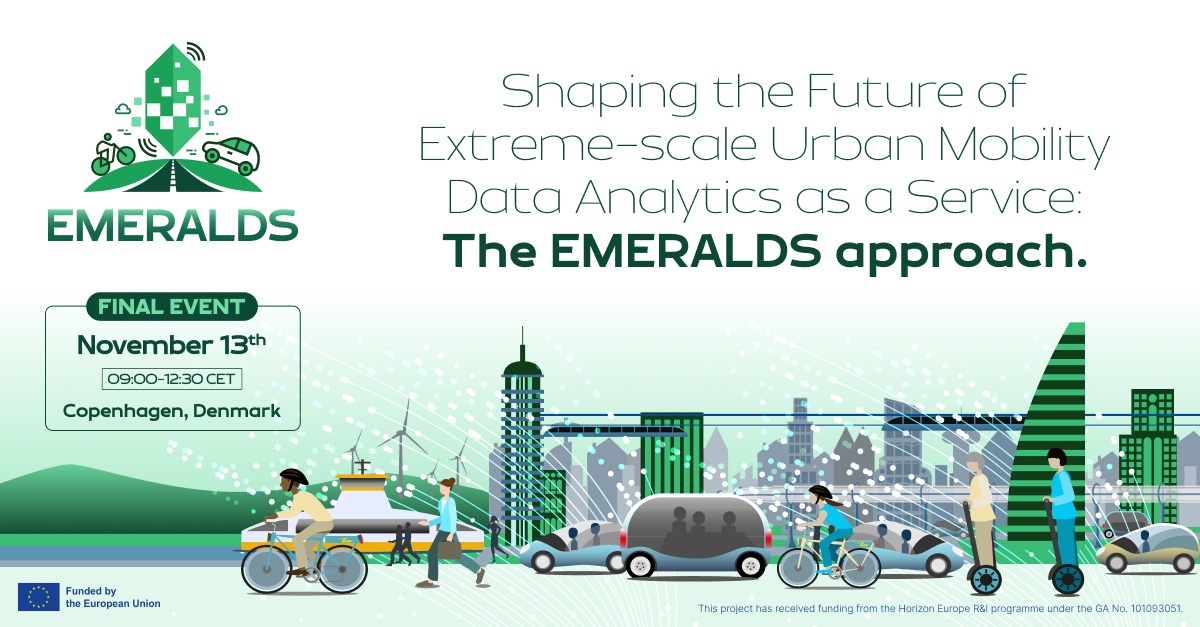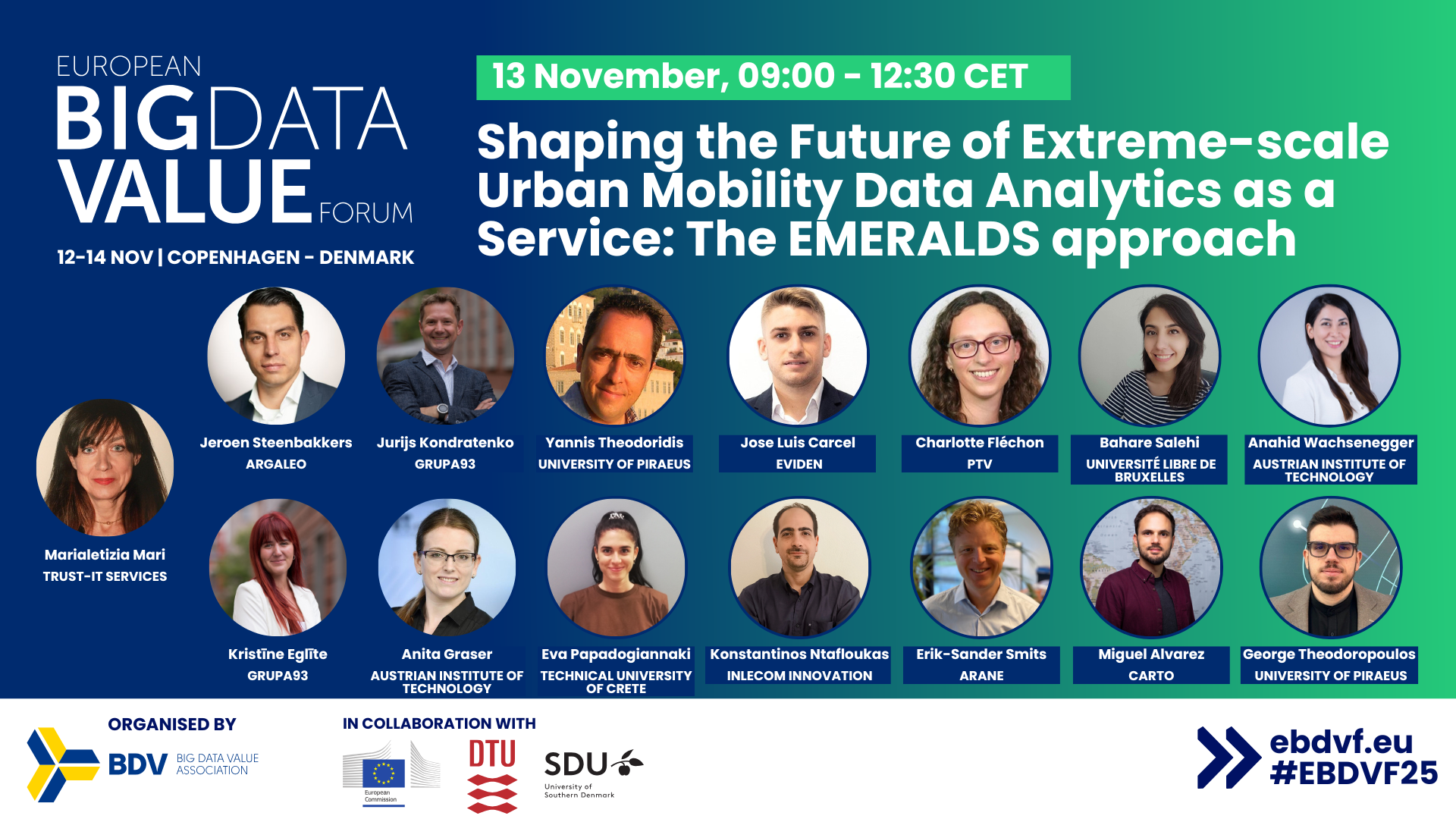
Exploring Mobility Data Intelligence for Smarter, Greener Cities
🗓 13 November 2025
📍 Co-located with the European Big Data Value Forum (EBDVF 2025), Denmark
🕘 09:00 – 12:30 CET
As part of the European Big Data Value Forum 2025, the EMERALDS project invites you to its Final Event, a three-hour workshop showcasing how advanced mobility data analytics and AI-driven solutions can transform the way we understand, plan, and optimise transport systems across Europe.
Over the past three years, EMERALDS has worked to bridge data science, artificial intelligence, and mobility management to create an open, scalable environment for Mobility AI as a Service. The project has brought together research institutions, public authorities, and technology providers to enable more efficient, sustainable, and secure urban mobility.
This final event will explore how EMERALDS’ services and infrastructure are supporting real-world applications—from traffic monitoring and trajectory analysis to intelligent transport optimisation. Participants will gain insights into:
- Innovative tools for in-situ and edge-based mobility data processing.
- New approaches to trajectory and spatio-temporal data analytics.
- Advanced frameworks for machine learning, explainable AI, and secure deployment.
- Practical demonstrations from pilot cities across Europe, including The Hague, Rotterdam, Riga, and York.
The session will be structured in two parts: an in-depth look at the EMERALDS architecture and analytical services, followed by live demonstrations from the project’s use cases in the urban mobility domain.
Join us to discover how EMERALDS is contributing to Europe’s data-driven future—making mobility smarter, safer, and more sustainable.
Important Note: We are happy to welcome you to the EMERALDS Final Event and meet you in person in Copenhagen! The workshop is co-located and in partnership with the European Big Data Value Forum (EBDVF) 2025, and therefore registration is subject to the purchase of a valid EBDVF conference ticket. No separate or online registration for the EMERALDS event will be available.

Agenda
| Timing | Speaker(s) | Topics and Discussion | |
|---|---|---|---|
Part I: EMERALDS Technical Achievements & Key Innovation Results |
|||
| 09:00 - 09:05 |
Konstantinos Dafloukas (INLECOM) |
The EMERALDS Horizon EU project – an Overview |
|
| 09:05 - 09:10 | Yannis Theodoridis (Uni. Piraeus) |
The EMERALDS Services – Advancing the State-of-the-art in Mobility Data Analytics. |
|
| 09:10 - 09:20 | George Theodoropoulos (Uni. Piraeus) |
In-situ Mobility Data Processing & Analytics. |
|
| 09:20 - 09:30 | Bahare Salehi (ULB) | Urban Traffic Monitoring and Interpolation. | |
| 09:30 - 09:40 | Anita Graser (AIT) | Trajectory Data Analysis with Trajectools & MovingPandas. | |
| 09:40 - 09:50 | Anahid Wachsenegger (AIT) | Active Learning & XAI over Mobility Data. | |
| 09:50 - 10:00 | José Luis Cárcel (EVIDEN) | The EMERALDS Mobility AI-as-a-Service Platform. | |
| 10:00 - 10:10 | Miguel Álvarez García (CARTO) | The EMERALDS Mobility Analytics Dashboard. | |
| 10:10 - 10:20 | Eva Papadogiannaki (TU Crete) | The EMERALDS Security Backbone. | |
| 10:20 - 10:30 | Marialetizia Mari (TRUST-IT) | Q&A | |
Part II: EMERALDS in Action - Use Cases in the Urban Mobility Domain |
|||
| 11:00 - 11:05 | Konstantinos Dafloukas (INLECOM) | The EMERALDS Urban Mobility Use-Cases – an Overview. | |
| 11:05 - 11:25 | Jeroen Steenbakkers (Argaleo) | Risk Assessment, Prediction, and Forecasting in Crowded Events - the case of The Hague Scheveningen, NL. | |
| 11:25 - 11:45 | Erik-Sander Smits (Arane) | Multi-modal Network Traffic Management - the case of Rotterdam, NL. | |
| 11:45 - 12:05 | Jurijs Kondratenko (Grupa 93) | Public Transport Trip Characteristics Inference and Traffic Flow Data Analytics - the case of Riga, LV. | |
| 12:05 - 12:20 | Charlotte Fléchon (PTV Group) | Transport Network Optimisation - the case of York, UK. | |
| 12:20 - 12:25 | Marialetizia Mari (TRUST-IT) | Q&A | |
| 12:25 - 12:30 | Konstantinos Dafloukas (INLECOM) | Concluding remarks | |